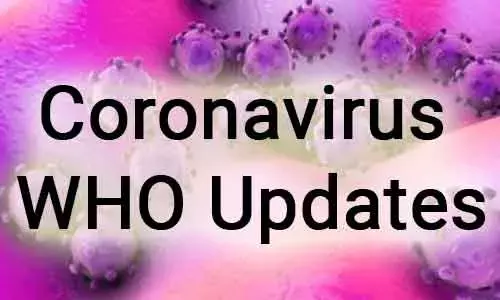- Home
- Medical news & Guidelines
- Anesthesiology
- Cardiology and CTVS
- Critical Care
- Dentistry
- Dermatology
- Diabetes and Endocrinology
- ENT
- Gastroenterology
- Medicine
- Nephrology
- Neurology
- Obstretics-Gynaecology
- Oncology
- Ophthalmology
- Orthopaedics
- Pediatrics-Neonatology
- Psychiatry
- Pulmonology
- Radiology
- Surgery
- Urology
- Laboratory Medicine
- Diet
- Nursing
- Paramedical
- Physiotherapy
- Health news
- Fact Check
- Bone Health Fact Check
- Brain Health Fact Check
- Cancer Related Fact Check
- Child Care Fact Check
- Dental and oral health fact check
- Diabetes and metabolic health fact check
- Diet and Nutrition Fact Check
- Eye and ENT Care Fact Check
- Fitness fact check
- Gut health fact check
- Heart health fact check
- Kidney health fact check
- Medical education fact check
- Men's health fact check
- Respiratory fact check
- Skin and hair care fact check
- Vaccine and Immunization fact check
- Women's health fact check
- AYUSH
- State News
- Andaman and Nicobar Islands
- Andhra Pradesh
- Arunachal Pradesh
- Assam
- Bihar
- Chandigarh
- Chattisgarh
- Dadra and Nagar Haveli
- Daman and Diu
- Delhi
- Goa
- Gujarat
- Haryana
- Himachal Pradesh
- Jammu & Kashmir
- Jharkhand
- Karnataka
- Kerala
- Ladakh
- Lakshadweep
- Madhya Pradesh
- Maharashtra
- Manipur
- Meghalaya
- Mizoram
- Nagaland
- Odisha
- Puducherry
- Punjab
- Rajasthan
- Sikkim
- Tamil Nadu
- Telangana
- Tripura
- Uttar Pradesh
- Uttrakhand
- West Bengal
- Medical Education
- Industry
Existing drugs may offer a first-line treatment for coronavirus outbreak

Norway: The number of people infected with the new coronavirus continues to skyrocket, with more than 80000 cases worldwide as of the end of February. But there's no vaccine or cure in sight, meaning that doctors can do little more than offer supportive treatment to the very sick and hope their bodies can survive the infection.
Now, however, a coalition of European researchers says that already approved drugs might hold the key to treating the new virus. Their findings have been published as a pre-proof in the International Journal of Infectious Diseases.
"Drug repurposing is a strategy for generating additional value from an existing drug by targeting diseases other than that for which it was originally intended," said Denis Kainov, the senior author on the paper and an associate professor at the Norwegian University of Science and Technology (NTNU). "For example, teicoplanin, oritavancin, dalbavancin and monensin are approved antibiotics that have been shown to inhibit corona- and other viruses in the laboratory."
Kainov and his co-authors say that these and other already tested "safe-in-man" broad-spectrum antiviral drugs are good candidates for treating the disease to start with, given that there are currently no treatments for the new coronavirus, which is called COVID-19 by the World Health Organization (WHO).
The WHO says the virus "can cause mild symptoms including a runny nose, sore throat, cough, and fever. It can be more severe for some persons and can lead to pneumonia or breathing difficulties. More rarely, the disease can be fatal. Older people, and people with pre-existing medical conditions (such as, diabetes and heart disease) appear to be more vulnerable to becoming severely ill with the virus."
The advantage of repurposing a drug is that all of the details surrounding the drug development are already known, from the chemical synthesis steps and manufacturing processes to information regarding the different phases of clinical testing.
"Therefore, repositioning of launched or even failed drugs to viral diseases provides unique translational opportunities, including a substantially higher probability of success to market as compared with developing new virus-specific drugs and vaccines, and a significantly reduced cost and timeline to clinical availability," the researchers wrote.
The researchers reviewed information on the discovery and development of broad-spectrum antiviral agents (BSAAs), which are drugs that target viruses from two or more different viral families. They summarized what they found for 120 drugs that had already been shown to be safe for humans use and created a database, which is freely accessible. Thirty-one of these were found by the researchers to be possible candidates for prophylaxis and treatment of the COVID-19 infections. The researchers also found that clinical investigations have recently begun of five possible drug candidates to treat the COVID-19 virus
"In the future, BSAAs will have global impact by decreasing morbidity and mortality from viral and other diseases, maximizing the number of healthy life years, improving the quality of life of infected patients and decreasing the costs of patient care," the researchers concluded.
For Further Reference please log on to:http://dx.doi.org/10.1016/j.ijid.2020.02.018
Medical Dialogues Bureau consists of a team of passionate medical/scientific writers, led by doctors and healthcare researchers. Our team efforts to bring you updated and timely news about the important happenings of the medical and healthcare sector. Our editorial team can be reached at editorial@medicaldialogues.in.
Dr Kamal Kant Kohli-MBBS, DTCD- a chest specialist with more than 30 years of practice and a flair for writing clinical articles, Dr Kamal Kant Kohli joined Medical Dialogues as a Chief Editor of Medical News. Besides writing articles, as an editor, he proofreads and verifies all the medical content published on Medical Dialogues including those coming from journals, studies,medical conferences,guidelines etc. Email: drkohli@medicaldialogues.in. Contact no. 011-43720751


